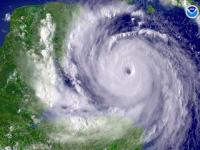Well-known author and blogger Chris Mooney has written a great post on what we can say about Hurricane Dean as it relates to global warming. This post will be especially helpful for media when the inevitable discussion of hurricanes and global warming pops up in the wake of Hurricane Dean.
So what can we say? As Chris explains, “It’s complicated.”
Here’s some key records Hurricane Dean broke:
- With a minimum central pressure of 906 millibars, Dean was the ninth most intense hurricane ever observed in the Atlantic basin (for comparison Hurricane Katrina’s minimum pressure was 902 millibars).
- That 906 millibar pressure reading was at landfall, making Dean the third most intense landfalling hurricane known in the Atlantic region and the first Category 5 storm at landfall since 1992’s Hurricane Andrew.
- When measured by minimum pressure, six of the ten most intense Atlantic hurricanes–Wilma, Rita, Katrina, Mitch, Dean, and Ivan–have occurred in the past ten years.
For an in-depth look at hurricanes and global warming check out Mooney’s new book Storm World.
Subscribe to our newsletter
Stay up to date with DeSmog news and alerts







